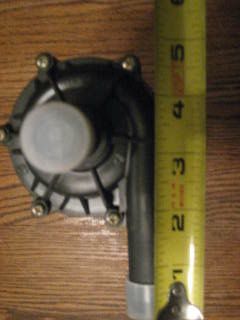water cooled I/c ?
#26
pre water injection or with water injection turned off I see 195+ f degree intake temps at 12-15 PSI off stock FD twin turbo's after less than 2 seconds of boost, the temps looked like they would continue to climb indef.
#27
Rotary $ > AMG $
iTrader: (7)
Joined: Apr 2005
Posts: 3,785
Likes: 26
From: And the horse he rode in on...
There is a theory that in actual practice, the intercooler, whether a-a or a-w, functions primarily as a temporary heat sink. And that a significant portion of the heat rejection is actually accomplished by re-absorption into the induction air during off boost times; This theory maintains that the extra mass is is one of the main reasons that a large FMIC is so effective. This theory also lends support to the w-a intercooler, since the mass available for thermal storage includes both the aluminum intercooler and the water as well.
What do you guys think about this theory?
What do you guys think about this theory?
#29
I have no intercooler installed, so yes those temps are sans intercooler.
The best thing about the water/alcohol injection is that the longer the car stays in boost the colder the air temp sensor and intake elbow gets, after 20 seconds in boost the air temp sensor is within 20 degrees of ambient.
I suspect this is due to heatsoaking of the aluminum intake elbow where the sensor is located (a GM type sensor).
The best thing about the water/alcohol injection is that the longer the car stays in boost the colder the air temp sensor and intake elbow gets, after 20 seconds in boost the air temp sensor is within 20 degrees of ambient.
I suspect this is due to heatsoaking of the aluminum intake elbow where the sensor is located (a GM type sensor).
#30
For those who think water->air intercoolers are a waste on a street car, consider some cars already on the road with them:
2003-4 Mustang Cobra
New Shelby GT500
Ford GT
SVT Ford Lightning
Several AMG vehicles
These came with water->air/air->water (whichever way is correct) setups from the factory. Now, these all use a roots/screw type supercharger which necessitates a small intercooler core mounted between the supercharger and the manifold. For this reason, a FMIC would be impossible. My point is they do work reliably.
Also, on the issue of heat soaking under boost. 5.0 Magazine did a test on a Mustang GT they installed a Vortech supercharger on. They did several tests with intake temp probes on the non-intercooled kit. Then they added the Power Cooler (air to water kit):

Note how small the heat exchanger is! Now the Vortech is a centrifugal type supercharger more on par with a turbo's compressor wheel so the results would be similar on a turbo car.
The intake temps (post intercooler) they measured while sitting in traffic were never more than 1-2 degrees above ambient, and in worst case scenario 2nd gear a 5000RPM (near redline @ max boost) for 2 mins the intercooler water temps never rose more than 3 degrees above ambient. Also, the temps were reduced 150 degrees from inlet to outlet of the intercooler. And as an added bonus, they added crushed ice to the reservoir before hitting the drag strip and dropped the intake temps (post intercooler) below ambient
My point is when properly sized (core/heat exchanger/reservoir) it is drastically more efficient, and intake plumbing is much shorter. I've bought the intercooler the OP pictured made by XSPOWER, lol. Had the end tank cut off and turned around, so it is not same side in/out. I have test fit it to take the place of the TMIC, and it fits perfectly. Now to get a heat exchanger, pump, and reservoir and start plumbing
Vince
2003-4 Mustang Cobra
New Shelby GT500
Ford GT
SVT Ford Lightning
Several AMG vehicles
These came with water->air/air->water (whichever way is correct) setups from the factory. Now, these all use a roots/screw type supercharger which necessitates a small intercooler core mounted between the supercharger and the manifold. For this reason, a FMIC would be impossible. My point is they do work reliably.
Also, on the issue of heat soaking under boost. 5.0 Magazine did a test on a Mustang GT they installed a Vortech supercharger on. They did several tests with intake temp probes on the non-intercooled kit. Then they added the Power Cooler (air to water kit):

Note how small the heat exchanger is! Now the Vortech is a centrifugal type supercharger more on par with a turbo's compressor wheel so the results would be similar on a turbo car.
The intake temps (post intercooler) they measured while sitting in traffic were never more than 1-2 degrees above ambient, and in worst case scenario 2nd gear a 5000RPM (near redline @ max boost) for 2 mins the intercooler water temps never rose more than 3 degrees above ambient. Also, the temps were reduced 150 degrees from inlet to outlet of the intercooler. And as an added bonus, they added crushed ice to the reservoir before hitting the drag strip and dropped the intake temps (post intercooler) below ambient

My point is when properly sized (core/heat exchanger/reservoir) it is drastically more efficient, and intake plumbing is much shorter. I've bought the intercooler the OP pictured made by XSPOWER, lol. Had the end tank cut off and turned around, so it is not same side in/out. I have test fit it to take the place of the TMIC, and it fits perfectly. Now to get a heat exchanger, pump, and reservoir and start plumbing

Vince
#32
It's not a theory, it's proven fact and makes perfect sense when you consider how heat flows from a hotter surface to a colder one, and what the temps are during and after a boost event. The intercooler absorbs heat from the air and it's temp increases, and when you lift off the air entering the IC will drop suddenly because it's no longer being compressed. So now the IC is hotter than the air so heat will flow from the IC to the air inside it. Heat is also flowing to the cooling air outside the IC (or water in the case of the W/A IC) at the same time as you'd expect. 

#33
How economical is an A/W IC? Can you just drop in any type of water into the resivior or does it need to be distilled? Is it similiar to a radiator or does the water actually evaporate?
Could one see similiar temperatures with a regular IC and Alcohol/Water injection or would that just be asinine?
Could one see similiar temperatures with a regular IC and Alcohol/Water injection or would that just be asinine?
#34
I used an a/w intercooler on a Nissan I had back in 1985 that worked pretty well. I used an oil cooler for a heat exchanger, which is mediocre in size relative to the i/c core IMO. If you will read post #11 on the first page of this thread, you will see what I'm using for a heat exchanger. I had planned on making a thread with pics of the install when I finish painting my engine bay. I can take pics of the parts I'll be using if anyone is interested.
#37
Ebay intercooler bought roughly a year ago for $100
I plan on bandsawing one of the collector tanks off and re-welding it on in the reverse direction so I can mount it TMIC style. I measured, it fits.

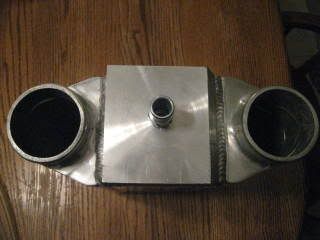

I found out now that you can buy one with collectors reversed from the same seller on Ebay, negating the need to cut and re-weld anything.
I plan on bandsawing one of the collector tanks off and re-welding it on in the reverse direction so I can mount it TMIC style. I measured, it fits.



I found out now that you can buy one with collectors reversed from the same seller on Ebay, negating the need to cut and re-weld anything.
#39
Radiator from an Arctic Cat ATV (barely used) bought on Ebay for $85 including fan, shroud, wiring, rad cap, temp sensor, and overflow tube. This eliminates the need for an additional reservoir. The core measures 12"x12" and the entire unit fits snugly next to the hood latch on the driver's side.
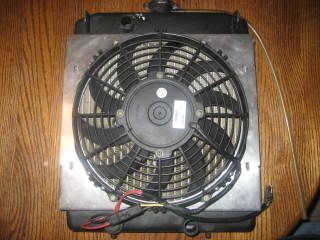
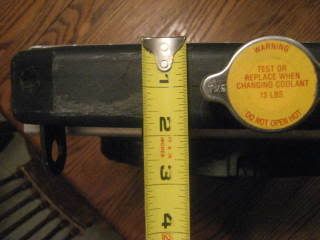
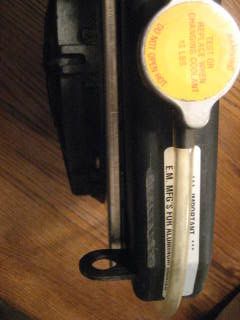



#41
As I said in an earlier post, I will make a thread illustrating the complete installation. First things first.....gotta use a tax refund to finish buying parts for the engine build, but I wanted to show all who may be interested in a project like this just how affordable and easy it can be.
#42
I don't agree with that. Even a small reservoir will hold a lot more water than the radiator, and a large water volume really helps with the heat soak issue by keeping most of the system's water out of the engine bay.
Great radiator through.
Great radiator through.
#43
I am also going to modify the end plates where the coolant goes in and out of the unit. IMO, the existing drilled and tapped holes are too small to allow good coolant flow across the entire core as you can see here:
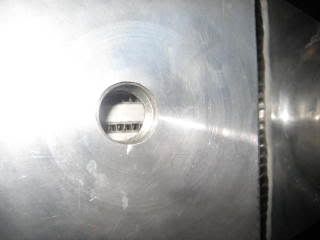
I am thinking about removing the end plates and drilling a larger hole, say around 2 1/2" dia. with a holesaw. I picture in my mind using some sort of collector to help direct coolant over a larger surface area of the core. I am going to traipse thru a salvage yard tomorrow to find something like a thermostat housing or water outlet from an import car and possibly mounting it to the end plates with drilled and tapped holes. If I'm thinking correctly, in order to make the IC the most efficient you would need a large volume of water going through it, so a collector should work.

I am thinking about removing the end plates and drilling a larger hole, say around 2 1/2" dia. with a holesaw. I picture in my mind using some sort of collector to help direct coolant over a larger surface area of the core. I am going to traipse thru a salvage yard tomorrow to find something like a thermostat housing or water outlet from an import car and possibly mounting it to the end plates with drilled and tapped holes. If I'm thinking correctly, in order to make the IC the most efficient you would need a large volume of water going through it, so a collector should work.
Last edited by scrip7; 01-03-08 at 10:48 PM.
#44

#45
I'm glad you guys are thinking this through and trying to make it practical. Okay, here's how to do it without trial and error:
1. Pick a radiator (i.e., air cooling water), based on your average boost, not your max boost.
2. Figure out how much heat you produce at max boost, not average boost. You can also this equation for the temperature before the intercooler (in degrees fahrenheit):
T = ((boost_psi + 14.7) / 14.7)^0.283 * 540 - 460
So then the heat produced is:
Q = (T - (water temp)) * C * M
where c = specific heat of air in Btu/F*lb.
M = the mass flow of air = 1.308L * ~5000rpm * 60s/min * (density of air)
You can lookup how to convert liters to cubic feet and you can look up the density of air. You can also look up the specific heat of air. "540" assumes it is 80 degrees fahrenheit outside (80 Fahrenheit + 460 = 540 Rankin). The actual temperature will be a little higher than the T you get above, thanks to the heat produced by the turbo. You could add maybe 20 degrees or so to be safe. And yep, that's right, even if the turbo is 100% efficient you produce a ton of heat simply by compressing the air.
3. Estimate a maximum temp you want the water to reach. Now decide the maximum amount of time you'll spend at maximum boost. So the amount of water you need is:
Mwater = Q * c * tmax * (Tmax - Tmin)
c = the specific heat of water
tmax = the max amount of time you'll spend at full boost
Tmax = the max temperature that the water will reach
Tmin = the minimum temperature that the water will drop down to
Mwater = the amount of water you need. 1 gallon weighs 8.34 lbs.
The actual amount of water you need will be less than this, because you'll be dumping some heat through the radiator. But this will give you a good ballpark.
1. Pick a radiator (i.e., air cooling water), based on your average boost, not your max boost.
2. Figure out how much heat you produce at max boost, not average boost. You can also this equation for the temperature before the intercooler (in degrees fahrenheit):
T = ((boost_psi + 14.7) / 14.7)^0.283 * 540 - 460
So then the heat produced is:
Q = (T - (water temp)) * C * M
where c = specific heat of air in Btu/F*lb.
M = the mass flow of air = 1.308L * ~5000rpm * 60s/min * (density of air)
You can lookup how to convert liters to cubic feet and you can look up the density of air. You can also look up the specific heat of air. "540" assumes it is 80 degrees fahrenheit outside (80 Fahrenheit + 460 = 540 Rankin). The actual temperature will be a little higher than the T you get above, thanks to the heat produced by the turbo. You could add maybe 20 degrees or so to be safe. And yep, that's right, even if the turbo is 100% efficient you produce a ton of heat simply by compressing the air.
3. Estimate a maximum temp you want the water to reach. Now decide the maximum amount of time you'll spend at maximum boost. So the amount of water you need is:
Mwater = Q * c * tmax * (Tmax - Tmin)
c = the specific heat of water
tmax = the max amount of time you'll spend at full boost
Tmax = the max temperature that the water will reach
Tmin = the minimum temperature that the water will drop down to
Mwater = the amount of water you need. 1 gallon weighs 8.34 lbs.
The actual amount of water you need will be less than this, because you'll be dumping some heat through the radiator. But this will give you a good ballpark.
#46

#47
OEM intercooler pump is awesome. I REALLY like this project but I'm curious as to when you are going to have the pump turn on? Whenever the engine in running? Only under boost or when the AIT > XXX*? Regardless I think it phenomenal
As a side note.... If you aren't going to be doing the welding yourself I would get a few quotes from local welders. You may find that it's cheaper to buy the new intercooler than pay someone to weld yours on - sadly.
As a side note.... If you aren't going to be doing the welding yourself I would get a few quotes from local welders. You may find that it's cheaper to buy the new intercooler than pay someone to weld yours on - sadly.
#48
OEM intercooler pump is awesome. I REALLY like this project but I'm curious as to when you are going to have the pump turn on? Whenever the engine in running? Only under boost or when the AIT > XXX*? Regardless I think it phenomenal
As a side note.... If you aren't going to be doing the welding yourself I would get a few quotes from local welders. You may find that it's cheaper to buy the new intercooler than pay someone to weld yours on - sadly.
As a side note.... If you aren't going to be doing the welding yourself I would get a few quotes from local welders. You may find that it's cheaper to buy the new intercooler than pay someone to weld yours on - sadly.
I plan on carefully monitoring AIT especially after the initial install. I will have 2 small rocker switches and relays, one to run the pump and the other to run the fan. Obviously when I want to kill a Vette, they would both be on. During highway cruising, I'll experiment with "pump only" AIT and maybe turn the fan on to watch for any additional drop in temp. I had even thought of building a simple timer circuit that would allow the pump/ fan to come on when I unlock the doors with the remote, to try and get any heat soak reduced while I buckle up and start the engine after short trips/ shopping etc. The rocker switch would become an override.
I don't have any TIG equipment, so I would be at the mercy of a local welder. You are probably spot on about the cost. I may try to contact the original seller of my intercooler to see if he'd be willing to do an exchange. Shipping costs would probably eat up the savings, so perhaps another forum member could use this one. It can also be mounted in the LF corner without any cutting or welding if the battery and leading coils were re-located.
#49
Ericgrau, very impressive post. I want to monitor pre-and- post I/C temps to help determine overall efficiency of both the turbo and I/C. I contacted Muythaibxr (Megasquirt guru) about adding a 2nd IAT input so I can datalog the temps in my MegaTune software, hopefully he can get that code written for us MS users.
This is becoming a pretty informative thread so far......perhaps when it starts to die down it could be cleaned up and archived. Lots of guys with 7's have considered a/w vs. a/a
This is becoming a pretty informative thread so far......perhaps when it starts to die down it could be cleaned up and archived. Lots of guys with 7's have considered a/w vs. a/a
#50
You know.... If you wanted to get really silly and had the outputs and the software to do it you could have the pump come on whe AIT are X>Y and then the rad fan turn on when they are >Y, you know.... keeping things simple  I like the timer ciruit idea to remove some heatsoak but I would think that both the pump & the fan would need to turn on to do that. Then again, depending on the programming when you start the engine they could both kick on. How long would it take to remove the heatsoak? I have no idea, but I usually get in the car, start it, buckle in settle down and give the motor a minute or so before I romp on it. Would that be enough time to pull some heat out?
I like the timer ciruit idea to remove some heatsoak but I would think that both the pump & the fan would need to turn on to do that. Then again, depending on the programming when you start the engine they could both kick on. How long would it take to remove the heatsoak? I have no idea, but I usually get in the car, start it, buckle in settle down and give the motor a minute or so before I romp on it. Would that be enough time to pull some heat out?
 I like the timer ciruit idea to remove some heatsoak but I would think that both the pump & the fan would need to turn on to do that. Then again, depending on the programming when you start the engine they could both kick on. How long would it take to remove the heatsoak? I have no idea, but I usually get in the car, start it, buckle in settle down and give the motor a minute or so before I romp on it. Would that be enough time to pull some heat out?
I like the timer ciruit idea to remove some heatsoak but I would think that both the pump & the fan would need to turn on to do that. Then again, depending on the programming when you start the engine they could both kick on. How long would it take to remove the heatsoak? I have no idea, but I usually get in the car, start it, buckle in settle down and give the motor a minute or so before I romp on it. Would that be enough time to pull some heat out?




